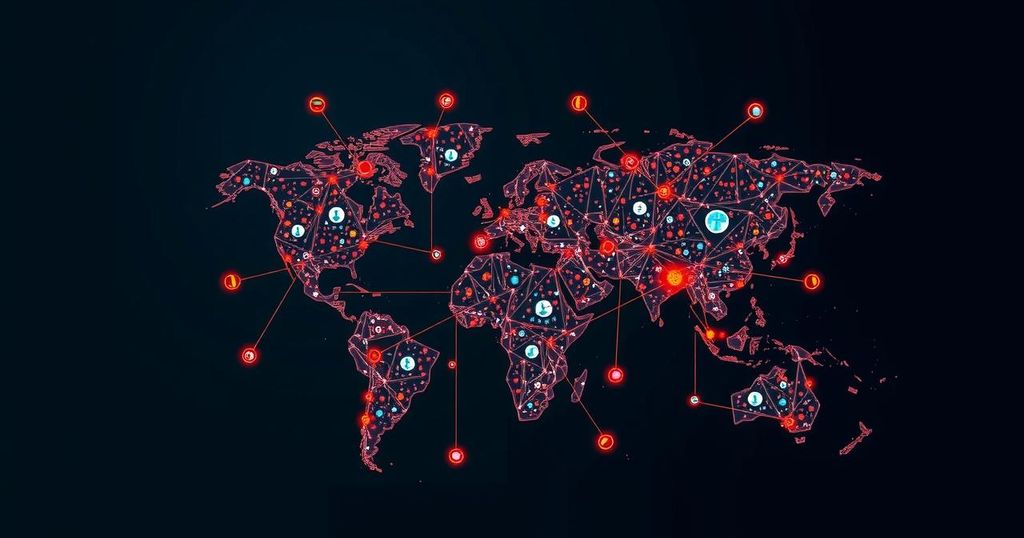Prime Minister Narendra Modi’s foreign policy is characterized by a human-centric approach aimed at establishing India as a major global player. This strategy emphasizes consensus-building, regional stability, and India’s active participation in global affairs, driven by its economic capabilities and humanitarian responses. Modi’s administration seeks to balance military preparedness with diplomatic efforts, focusing on cooperative relations while addressing historical challenges, particularly with Pakistan and China. Through initiatives in climate action and technology, India aims to position itself strategically in the evolving global order.
In an increasingly uncertain global landscape, Prime Minister Narendra Modi’s foreign policy is marked by a human-centric approach aimed at positioning India as a formidable player in international affairs. His vision is deeply rooted in Indian civilizational principles, particularly dharma and vasudhaiva kutumbakam, advocating for a world united as one family. Under his leadership, India has transitioned from merely observing global dynamics to actively participating in shaping them, particularly through its robust economic initiatives and humanitarian responses during crises. Despite India’s exclusion from the United Nations Security Council’s permanent membership, which has left it susceptible to the power plays of larger nations, Modi has effectively repositioned India as a key global player. Over the past decade, India has enhanced its role in international diplomacy, leveraging economic strength and humanitarian aid to assert itself as a credible voice on issues like the North-South and East-West divides. The example of India’s diplomatic stance towards the recent territorial conflicts illustrates this transformation effectively. Furthermore, Modi’s administration emphasizes consensus building in a fragmented world where multilateral engagements are often complicated. The Kazan BRICS summit exemplifies India’s ability to balance conflicting geopolitical positions, maintaining relationships while still firmly addressing humanitarian concerns, thus embodying a pragmatic approach. The focal point of Modi’s diplomacy redirects the narrative from dominance to cooperation, advocating dialogue over confrontation across all platforms, particularly through initiatives during India’s G20 presidency. Regional relations continue to be a challenge, with longstanding disputes concerning Pakistan and China. Modi’s policies exhibit a dual tactic of military preparedness matched by dialogue, striving for normalized relations especially with China. The path forward requires addressing trade imbalances while bolstering local industries as seen in initiatives like Aatmanirbhar Bharat. India’s commitment to its neighbors illustrates further diplomatic pragmatism; efforts to stabilize relations with Bangladesh and the Maldives showcase active engagement in regional prosperity. Enhancing oversight on aid programs could yield better outcomes, especially in fostering cooperation with Pakistan. A measured approach to addressing historical grievances could facilitate forward momentum in bilateral relations, provided there is a willingness from both sides. Internationally, India has taken a lead in addressing core developmental issues such as climate change, having already attained its Paris Agreement targets ahead of schedule. Modi’s advocacy for clean energy and digital transitions underscores India’s aspirations of becoming a developed nation. However, the challenges of geopolitical shifts necessitate strategic adaptations to maintain economic growth amidst de-risking trends relative to China’s economy. While conflicts such as those in Ukraine and Gaza present risks of domestic unrest fueled by external propagandistic influences, the Indian diaspora remains a strong pillar of support for Modi’s vision of a developed India despite the underlying threats posed by terrorism and separatist elements. Critically, Modi’s foreign policy balances assertive regional posturing with pragmatic dialogues, positioning India more resiliently on the global stage. Future interactions with Western powers will be pivotal for India’s strategic advancements, especially in light of shifting political climates in the US. As India continues to elevate its stance on the global front, the necessity for a reformed rules-based international order that reflects contemporary challenges becomes ever more pressing, suggesting that Modi’s vision will navigate India through intricacies of future diplomacy.
The article discusses India’s evolving foreign policy under the leadership of Prime Minister Narendra Modi, highlighting a strategic shift towards a more active and human-centric approach. Amidst global uncertainty, Modi’s administration focuses on consensus-building, regional engagement, and pragmatic diplomacy aimed at establishing India as a key player in international affairs. The challenges posed by rival nations and conflicts in regions like Ukraine and Gaza further add to the complexity of India’s geopolitical landscape, necessitating a careful balance between military readiness and diplomatic dialogue. The background underlining this discussion emphasizes India’s aspirations for greater influence on the world stage, the need to develop resilient economic frameworks, and the importance of navigating historical tensions with countries like Pakistan and China. Modi’s policies strive to create stability in the neighborhood and advocate for collaborative global solutions to pressing issues like climate change and technological advancement.
In conclusion, Prime Minister Narendra Modi’s foreign policy epitomizes a shift towards a more assertive and human-centric diplomatic agenda, striving to position India as a prominent global player amid various challenges. By promoting consensus-building and regional stability, Modi’s administration seeks to enhance India’s economic and geopolitical standing. The complexities of global relationships, particularly with neighboring countries and influential powers, require a careful balance of military readiness and diplomatic engagement. As India navigates its path forward, the vision for a developed and strengthened nation remains central to its international strategy.
Original Source: www.hindustantimes.com







